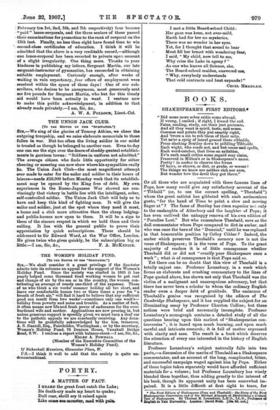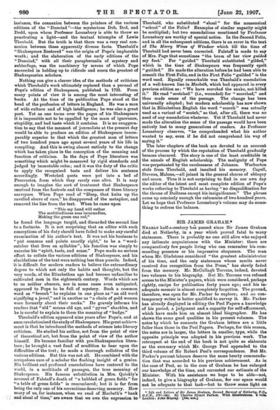BOOKS.
SHAKESPEARE'S FIRST EDITORS.•
"Did some more sober critic oome abroad, If wrong, I smiled ; if right, I kissed the rod. Pains, reading, study, are their jest pretence, And all they want is spirit, taste, and sense. Commas and points they put exactly right, And livere a sin to rob them of their mita. Yet ne'er a sprig of laurel graced these ribbalds, From slashing Bentley down to piddling Tibbalds. Each wight, who reads not, and but scans and spells, Each word-catcher, that lives on syllables, Ev'n such small critics some regard may claim, Preserved in Milton's or in Shakespeare's name. Pretty ! in amber to observe the forms Of hairs, or straws, or dirt, or grubs, or worms ! The things we know are neither rich nor rare, But wonder how the devil they got there."
OF all those who are acquainted with these famous lines of Pope, how many could give any satisfactory account of the " Tibbald" (or, to use the correct spelling, " Theobald") whom the great satirist has gibbeted with such acrimonious gusto, "for the hand of Time to point a slow and moving finger at" ? The fame of Bentley has risen superior not only to the onslaughts of Atterbury and the laughter of Pope; it has even outlived the unhappy renown of his own edition of "Paradise Lost." But who remembers, Theobald, save as the dull commentator whom Pope compared to dirt in amber, and who was once the hero of the "Dunciad," until he was replaced in that honourable position by Colley Cibber ? Indeed, the amber which preserves Theobald's memory now is not the verse of Shakespeare ; it is the verse of Pope. To the great majority of readers it is of little consequence whether Theobald did or did not "crucify poor Shakespeare once a week" ; what is of consequence is that Pope said so.
Yet there can be no doubt that this view of Theobald is a totally unjust one. Professor Lounsbury, in a work which forms an elaborate and crushing commentary to the lines of Pope quoted above, has shown not only that Theobald was the victim of a malignant and unscrupulous adversary, but that there has never been a scholar to whom the ordinary English reader owes a deeper debt of gratitude. The eminence of Theobald'a genius was recognised by the editors of The Cambridge Shakespeare, and it has supplied the subject for an illuminating essay by Professor Churton Collins; but these notices were brief and necessarily incomplete. Professor Lounsbury's monograph contains a detailed study of all the questions bearing upon this earliest of "Shakespearian con- troversies "; it is based upon much learning, and upon much careful and intricate research ; it is full of matter expressed with clarity and ease. The result is a book which deserves the attention of every one interested in the history of English literature.
Professor Lounsbury's subject naturally falls into two parts,—a discussion of the merits of Theobald as a Shakespeare commentator, and an account of the long, complicated, bitter, and successful campaign waged against him by Pope. Either of these topics taken separately would have afforded sufficient materials for a volume; but Professor Lounsbury has wisely blended them together, thus adding greatly to the interest of his book, though its apparent unity has been somewhat im- paired. It is a little difficult at first sight to trace, for a The Ewe/ Editors of Shakespeare (Pope and Thootald): iks Story of the Bird Shakespearian Controversy and of the Earliest Attempts at Establishmg a Critical Teal of Shakespeare. By Thomas B. Lounebury, L.H.D., LL.D., Professor of English M Yale truivensity, London: David Nutt. oos ea. set.]
instance, the connexion between the printers of the various editions of the "Dunciad "—the mysterious Dob, Dod, and Dodd, upon whom Professor Lounsbury is able to throw so penetrating a light—and the textual triumphs of Lewis Theobald. But the truth is that there was a very real con- nexion between these apparently diverse faots. Theobald's "Shakespeare Restored" was the origin of Pope's implacable wrath; and the elaboration of the early editions of the "Dunciad," with all their paraphernalia of mystery and subterfuge, was the machinery by means of which Pope succeeded in holding up to ridicule and scorn the greatest of Shakespearian scholars.
Nothing can give a clearer idea of the methods of criticism which Theobald's work ultimately replaced than a perusal of Pope's edition of Shakespeare, published in 1725. From many points of view it is among the most interesting of books. At the time of its publication Pope stood at the head of the profession of letters in England. He was a man of wide culture and of high intelligence ; he was also a great poet. Yet as one turns over the pages of his Shakespeare it is impossible not to be appalled by the mass of ignorance, stupidity, and bad taste which it contains. It is no exaggera- tion to say that the meanest of journalists at the present day would be able to produce an edition of Shakespeare incom- parably superior to that which the greatest man of letters of two hundred years ago spent several years of his life in compiling. And this is owing almost entirely to the change which has taken place in the conception of the meaning and function of criticism. In the days of Pope literature was something which might be measured by rigid standards and judged by immutable rules; and it was the duty of the critic to apply the recognised tests and deliver his sentence accordingly. Wretched poets were put into a bed of Procrustes, from which they rarely rose alive. It is easy enough to imagine the sort of treatment that Shakespeare received from the footrule and the compasses of these literary surveyors. When Pope read of "Sleep, that knits up the ravelled sleeve of care," he disapproved of the metaphor, and removed the line from the text. When he came upon "This my hand will rather The multitudinous seas inearnadine, Making the green one red," he found the language turgid, and discarded the second line to a footnote. It is not surprising that an editor with such conceptions of his duty should have failed to make any careful examination of his author's text. It was not his business to "put commas and points exactly right," to be a "word- catcher that lives on syllables " ; his function was simply to exercise his " spirit, taste, and sense." Pope made no serious effort to collate the various editions of Shakespeare, and his elucidations of the text were nothing less than puerile. Indeed, it is difficult for modern readers to believe the extraordinary degree to which not only the habits and thoughts, but the very words, of the Elizabethan age bad become unfamiliar to cultivated men in the eighteenth century. Words which are to us neither obscure, nor in some cases even antiquated, appeared to Pope to be full of mystery. Such a common word as " brooch " he explains in one place as "an old word signifying a jewel," and in another as "a chain of gold women wore formerly about their necks." He gravely informs his readers that "eld" means old age, and "gyves" shackles, and he is careful to explain to them the meaning of "budge."
Theobald's edition appeared nine years after Pope's, and at once revolutionised the study of Shakespeare. His great achieve- ment is that be introduced the methods of science into literary criticism. He studied his author, not from the point of view of theoretical art, but from the point of view of the author himself. He became familiar with pre-Shakespearian litera- ture ; he brought a vast fund of erudition to bear upon the difficulties of the text ; he made a thorough collation of the various editions. But this was not all. He combined with the scrupulous care of a scholar the flashing insight of a genius. His brilliant and profound emendations have restored to the world, in a multitude of passages, the true meaning of Shakespeare. His famous substitution in Mrs. Quickly's account of Falstaff's death of "a babbled of green fields" for "a table of green fields" is remembered; but it is far from being the only one of his corrections deserving memory. How many of us, for instance, when we read of Macbeth's "bank and shoal of time," are aware that we owe the expression to Theobald, who substituted "shoal" for the nonsensical "school" of the Folio P Examples of similar sagacity might be multiplied; but two emendations mentioned by Professor Lounsbury are worthy of special notice. In the Second Folio, and in all the subsequent editions, there is an error in the text of The Merry Wives of Windsor which till the time of Theobald had never been corrected. Falstaff is made to say of Mrs. Page that sometimes "the beam of her view guided my foot." For "guided" Theobald substituted " gilded," which in the time of Shakespeare was frequently spelt " guilded." He made the alteration before he had been able to consult the First Folio, and in the First Folio " gnilded " is the word used. Equally remarkable was Theobald's emendation of a well-known line in Macbeth, which had appeared in every previous edition as: " We have scorched the snake, not killed it." He read "scotched" (i.e., wounded) for " scorched," and thus made sense of the passage. The change has been universally adopted; but modern scholarship has now shown that in Elizabethan English the word "scorch" was actually used as a variant of " scotch," so that, after all, there was no need of any emendation whatever. Yet if Theobald had never made the alteration the sense of the passage would have been entirely lost to many generations of readers. As Professor Lounsbury observes, "he comprehended what his author wanted to say, even if he did not comprehend his way of saying it."
The later chapters of the book are devoted to an account of the process by which the reputation of Theobald gradually became obscured. The story is one of the least creditable in the annals of English scholarship. The malignity of Pope was perpetuated by the carelessness of Johnson. Warburton stole from Theobald, and insulted his memory. Capell, Stevens, Malone,—all joined in the general chorus of obloquy and scorn. Thus it is not surprising to find in our own day the editor of the latest and most complete edition of Pope's works referring to Theobald as having "no disqualification for the throne of Dullness except his insignificance." The phrase sums up concisely enough the calumnies of two hundred years. Let us hope that Professor Lounsbury's volume may do some- thing to redress the balance.











































 Previous page
Previous page